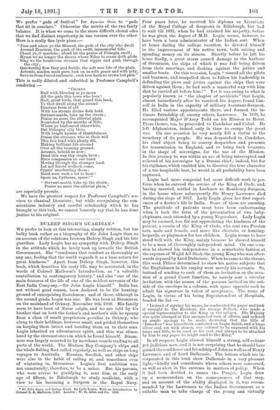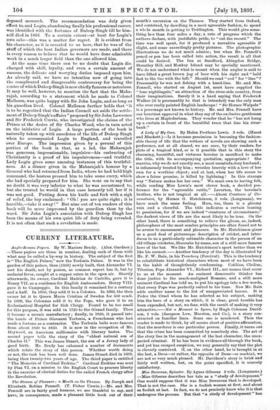DULEEP SING H'S GUARDIAN.* WE prefer to look at this
interesting, simply written, but too bulky book rather as a biography of Sir John Login than as an account of the relations between Duleep Singh and his late guardian. Lady Login has no sympathy with Duleep Singh in the attitude which he lately took up towards the British Government. She " condemns that conduct as thoroughly as any one, feeling that the world regards it as a base return for great kindness." Apart from Duleep Singh, however, this book, which describes his early life, may be accounted, in the words of Colonel Malleson's Introduction, as " a valuable contribution to contemporary history," and also "one of the main features of the life of one of the noblest servants of the East India Company,—Sir John Login himself." India has, not without good reason, been declared to be the hunting- ground of enterprising Scotch men ; and of these, although in the second grade, Login was one. He was born at Stromness, on the mainland of Orkney, November 9th, 1809. His family seem to have been of Norse origin, and we are told by his brother that on both the father's and mother's side he sprang from a class of small proprietors peculiar to Orkney, who clung to their holdings, however small, and prided themselves on keeping them intact and handing them on to their sons. Login inherited an adventurous spirit, and this was stimu- lated by the circumstances in which he found himself. Strom- ness was largely resorted to by merchant-vessels trading to all parts of the world. The Hudson Bay Company's ships and the whale-fishing fleet called regularly, as well as ships on long voyages to Australia. Russian, Swedish, and other ships were also in the habit of calling at, and sometimes even of wintering in, Stromness. Login's first ambition was, not unnaturally, therefore, to be a sailor. But his parents, who were averse to gratifying it, sent him, at the early age of fifteen, to Edinburgh to study medicine, with a view to his becoming a Surgeon in the Royal Navy.
• Sir John Login and Duleep Singh. By Lady Login. With an Introduction by Colonel E. B. Waleson, 0.B.L London : W. II. Allen and Co. 1890.
Four years later, he received his diploma as Licentiate of the Royal College of Surgeons in Edinburgh, but had to wait till 1831, when he had attained his majority, before he was given the degree of M.D. Login seems, however, to have been a born administrator of the Indian sort. When at home during the college vacation, he devoted himself to the improvement of his native town, both raising and spending money on its streets. Shortly before he left his home finally, a great storm caused damage to the harbour of Stromness, the ships of which it was full being driven from their moorings, and dashing against the jetties and smaller boats. On this occasion, Login " roused all the pilots and boatmen, and compelled them to follow his leadership in defending the piers and jetties against the ships that were driven against them ; he had such a masterful way with him that he carried all before him I" Yet it was owing to what is popularly known as " the chapter of accidents " that Login, almost immediately after he received his degree, found him- self in India in the capacity of military Assistant-Surgeon. He filled various appointments there, and formed the in- timate friendship of, among others, Lawrence. In 1839, he accompanied Major D'Arey Todd on his Mission to Herat.
From thence, too, he proceeded to Candahar and Cabal. He left Afghanistan, indeed, only in time to escape the great war. On one occasion he very nearly fell a victim to the treachery of its people. He was despatched to Candahar, his chief object being to convey despatches and presents for transmission to England, and to bring back treasure, in the shape of sovereigns, for the use of the Mission. In this journey he was within an ace of being intercepted and relieved of his sovereigns by a Durani chief ; indeed, but for his vigilance, which enabled him to discover the true character of a too hospitable host, he would in all probability have been captured.
Login had more congenial but more difficult work to per.
form when he entered the service of the King of Oude, and, having married, settled in Lucknow as Residency Surgeon, in the house where subsequently Sir Henry Lawrence died during the siege of 1857. Lady Login gives her first experi- ences of a doctor's life in India. Some of these are amusing.
The gratitude of patients must have been embarrassing when it took the form of the presentation of two baby- elephants, each attended by a young Negro slave. Lady Login may be excused, too, for not appreciating the kindness of the patient, a cousin of the King of Oude, who sent two Persian cats, male and female, and more like cheetahs or hunting.
leopards, as playmates for her children. Login seems to have stood well with the King, mainly because he showed himself to be a man of thoroughly independent mind. On one occa- sion he showed his independence in a remarkable fashion at the expense of Wajid Ali Shah, the young King who was after- wards deposed by Lord Dalhousie. When he came to the throne, this weak Prince determined to show his native subjects that the Englishmen in his employ were merely his servants. So,
instead of sending to each of them an invitation on the occa- sion of a grand Court function, he merely sent a circular invitation, with the names of the persons invited on the out- side of the envelope in a column, with space opposite each to admit his signature in token of acceptance. The name of Login, in virtue of his being Superintendent of Hospitals,
headed the list :—
"Instead of signing his name, he confiscated the paper and took it straight to the Resident, Sir George Pollock, who made a special representation to the King on the subject. His Majesty was quite alarmed at this unexpected turn of affairs, and ordered an ample apology to be made, decreeing that the title of
Bahadoor ' was henceforth conferred on Login Sahib, and a huge silver seal, set with stones, was ordered to be engraved with his name and title, to be used as his seal, and always to be attached by him to any paper he might send to the King."
In all respects Login showed himself a strong, self-reliant' yet judicious man, and it is not surprising that he should have gained the confidence and friendship of John as well as of Henry
Lawrence, and of Lord Dalhousie. The letters which are in- corporated in this book show Dalhousie in a very pleasant light,—kindly and considerate where others were concerned, as well as alert in the extreme in matters of policy. When it had been decided to annex the Punjab, Login drew
up a memorandum on the consequences of that step, and on account of the ability displayed in it, was recom-
mended by the Lawrenees to the Indian Government as a suitable man to take charge of the young and virtually deposed monarch. The recommendation was drily given effect to, and Login, abandoning finally his professional career, was identified with the fortunes of Duleep Singh till he him- self died in 1863. To a certain extent—at least for Login's own sake—this was a matter for regret. It is evident from his character, as it is revealed to us here, that he was of the stuff of which the best Indian governors are made, and there is every reason to believe that he would have done admirable work in a much larger field than the one allowed him.
At the same time there can be no doubt that Login dis- charged with skill, loyalty, and even a certain amount of success, the delicate and worrying duties imposed upon him. As already said, we have no intention now of going into the complicated and disagreeable controversy for being the centre of which Duleep Singh is now chiefly famous or notorious. It may be well, however, to mention the fact that the Maha- rajah, according to a statement which he made to Colonel Malleson, was quite happy with Sir John Login, and so long as his guardian lived. Colonel Malleson further holds that " it is to be regretted that the Indian Council set aside the settle- ment of Duleep Singh's affairs " proposed by Sir John Lawrence and Sir Frederick Carrie, who investigated the claims of the Prince at the desire of Sir Charles Wood, who in turn acted on the initiative of Login. A large portion of the book is naturally taken up with anecdotes of the life of Duleep Singh when he accompanied Login to England, and travelled over Europe. The impression given by a perusal of this portion of the book is that, as a lad, the Maharajah was generous, impressionable, impulsive—his embracing of Christianity is a proof of his impulsiveness—and truthful. Lady Login gives some amusing instances of this truthful- ness. At a dinner given in the Maharajah's honour by a General who had returned from India, where he had held high command, the hostess pressed him to take some curry, which she had specially prepared for him. She went on to say that no doubt it was very inferior to what he was accustomed to, but she trusted he would in that case honestly tell her if it was not good. Patting down his knife and fork with a sigh of relief, the boy exclaimed : " Oh ! you are quite right ; it is horrible,—take it away !" But nine out of ten readers of this book will be more impressed by the guardian than by the ward. Sir John Login's association with Duleep Singh has been the means of his own quiet life of duty being revealed. It is not often that such a revelation is made.



















































 Previous page
Previous page